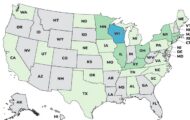A new study conducted at the Harvard School of Public Health and published in the Bulletin of Insectology has found that two widely used neonicotinoids (pesticides) appear to “significantly harm honey bee colonies over the winter.” And the colder the winter, the more severe the harm. The study replicated a 2012 finding that found a link between low doses of imidacloprid, a neonicotinoid, and Colony Collapse Disorder (CCD) that makes bees abandon their hives and die. A second pesticide called clothianidin has the same effect.
 The study also found that reduced resistance to mites or parasites because of pesticide exposure is not the issue in CCD, as scientists have suspected. Bees in hives with CCD had “almost identical” levels of pathogen infestation as a group of control hives, most of which survived the winter. Another biological mechanism that leads to CCD is being caused by the pesticides.
The study also found that reduced resistance to mites or parasites because of pesticide exposure is not the issue in CCD, as scientists have suspected. Bees in hives with CCD had “almost identical” levels of pathogen infestation as a group of control hives, most of which survived the winter. Another biological mechanism that leads to CCD is being caused by the pesticides.
Lead author Dr. Chensheng (Alex) Lu, associate professor of environmental exposure biology at HSPH said in a statement, “we demonstrated again in this study that neonicotinoids are highly likely to be responsible for triggering CCD in honey bee hives that were healthy prior to the arrival of winter.”
There have been significant honey bee losses from CCD since 2006. Bees are the primary pollinators of about one-third of all crops worldwide. If honeybees disappear, mankind will be in serious jeopardy.
The scientists looked at 18 bee colonies in central Massachusetts from October 2012 through April 2013. Six colonies were separated into three groups – one treated with imidacloprid, one with clothianidin, and one left untreated.
There was a steady decline in the size of all of the colonies over the winter, which is typical in New England. In January 2013, the populations in the control colonies increased, but populations in the hives treated with the pesticides continued to decline. By April 2013, half of the neonicotinoid-treated colonies were lost, with abandoned hives. Only one of the control colonies was lost, because of an intestinal parasite.
The authors conducted a similar study in 2012. In that, bees in pesticide-treated hives had a 94% mortality rate. The weather during that study was much colder and more prolonged. The scientists think that colder temperatures in combination with the pesticides play a role in the severity of CCD.





This is sad, but also really amusing to me. Some 15 plus years ago, my father, a well read welder in a local mill commented on an an article concerning the decrease in population among the honey bees. To paraphrase, he said he’s baffled that all the well educated minds aren’t pointing the finger at pesticides. There a bunch of idiots he exclaimed, there too famed worried about protecting big business rather than stating the truth.
Now, a man in my 40’s I’ve come to realize my fathers crumbles about protecting big business is most always true. You don’t need to be a genius or an Ivy League grad to connect the dots. I’m sure True Green and all the pesticide companies have lobbyist and professional studies to defend their products from such claims. There again, my neighbor cares more about his blades of grass than the bees anyhow. Maybe one day we’ll wake up and realize that the bees are a microcosm of the suffrage we will face in time
from the same life endangering pollutants. But hush… seal your lips, and quit spouting false statements because the pesticides are just fine… According to the pesticide companies of course and their paid-for politicians and lobbyist.
I’m just shaking my head and thinking – what a bunch of well educated idiots.
That pesticides kill bees is now a scientific fact, OK, what are you going to do about it?
Well, consumers can complain to companies that make the chemicals, sign petitions against their use, and vote for politicians who pledge to do something about it. Other than that, we don’t have much power. It’s going to take someone WITH power to try to fix this before it’s too late.